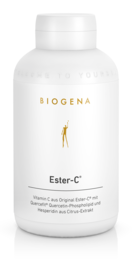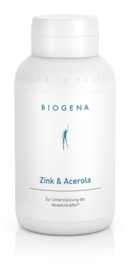Vitamin C is a vitamin for all seasons. This immunity classic is not only in demand during the cold season, it is also a warm weather vitamin, which proves its qualities either in the course of extensive sunbathing or when travelling by air. Learn more about the benefits of vitamin C, how much vitamin C we need and how to best use vitamin C.
What is vitamin C?
Vitamin C is a water-soluble vitamin that contributes to countless functions in the human body. Vitamin C is essential (= vital) for us humans and some mammalian species – i.e. it must be supplied regularly and in sufficient quantities from external sources. But that was not always the case! Just like other mammals, humans were able to form their own vitamin C once upon a time. However, a gene mutation robbed us of the ability to form vitamin C enzymatically in our liver. Without this loss, we would probably still be able to create our own vitamin C to this day.
What is vitamin C good for? – A very important vitamin for health
Vitamin C is essential for many functions in our body. This all-rounder supports our defences, helps protect our cells from oxidative stress and is also considered a beauty nutrient due to its role in collagen production. But that’s not all by a long shot!
Overview of the functions & effect of vitamin C
Vitamin C…
- contributes to the normal function of the immune system, especially during and after intensive physical activity
- supports normal collagen formation – for the normal function of skin, gums and vessels including cartilage, bones and teeth
- contributes to the normal functioning of the mind and nervous system
- supports normal energy metabolism and helps reduce tiredness and fatigue
- increases iron absorption
- helps protect cells from oxidative stress (free radicals)
Vitamin C and collagen formation
The fact that vitamin C is a classic of the immune system is well known by all. But did you know that the water-soluble vitamin is also instrumental in beauty? In fact, it contributes to the normal formation of the structural protein collagen. Collagen is the most commonly found protein in the human body, accounting for over 30% of all proteins. As a basic structural protein, collagen is in place where firmness and shape are needed, from vessels to teeth and gums, bones and cartilage to skin. In our skin, collagen, at around 80%, is the main component and forms our “inner corset” together with elastin fibres.
In this context, the EFSA (European Safety Agency) has reviewed the following health-related information for vitamin C and confirmed it as scientifically proven:
- Vitamin C contributes to the normal creation of collagen and the normal functioning of the skin.
- Vitamin C helps with the normal creation of collagen and the normal functioning of the teeth and gums.
- Vitamin C contributes to the normal creation of collagen and the normal functioning of the blood vessels.
- Vitamin C contributes to the normal creation of collagen and the normal functioning of the bones and cartilage.
Vitamin C and immune defences
Vitamin C is probably THE nutrient that comes to mind first when it comes to the immune system. The water-soluble vitamin contributes to the normal functioning of the body’s defences and contributes to the protection of our cells, such as our immune cells, from oxidative stress.
The EFSA also confirms the following statements with regard to the role of vitamin C for the functioning of the immune system:
- Vitamin C contributes to the normal functioning of the immune system.
- Vitamin C helps protect the cells from oxidative stress.
Vitamin C and oxidative stress
Vitamin C is an important anti-oxidant for oxidative stress due to its antioxidant properties. Oxidative stress occurs when the body has an imbalance between radicals (= oxidants) and radical scavengers (= antioxidants). Normally, these aggressive particles are not a problem for our body. After all, they are naturally created day after day during many metabolic processes in our body. However, free radicals become what we call “stress” when their counterweight – our antioxidant protection network – no longer manages to keep them in check.
For example, certain environmental factors, such as unprotected sunbathing, air travel, alcohol or mental stress, can lead to an increased occurrence of radicals and become a stress test. To maintain balance, a fit antioxidant protection network is essential. Vitamin C is considered an important team player within this network and helps protect our cells from oxidative damage.
Vitamin C and histamine
Histamine is a biogenic amine (= a protein compound) that is formed by our body as well as found in our diet. Foods that are stored longer or subject to a maturation process are considered particularly high in histamine. In our bodies, histamine is broken down by the enzyme diamine oxidase (DAO), which requires vitamin B6, copper and zinc. Also, vitamin C should not be ignored when it comes to histamine, because it acts as an opponent to biogenic amine.
Vitamin C and good aging
We all age. But some are better at it than others. Especially in the last third of life, it has been shown that not all people in their peer group are equally fit and fresh. This difference is not only attributable to our genes. After all, aging is a complex process that is influenced by many factors. One of these is oxidative stress caused by an excess of free radicals which, if left unchecked, can damage cells and body structures.
Fortunately, our bodies have an antioxidant network of protection that can keep free radicals at bay. Vitamin C is also part of this, helping to protect our cells from oxidative damage. With its role in collagen formation, vitamin C contributes to the normal function of our skin and vessels, teeth and gums, as well as our bones and cartilage, regardless of our age.
Vitamin C and blood pressure
Often disregarded by young people, the topic of blood pressure – often more or less inevitably – comes into focus with increasing age (with poor nutrition and little exercise even earlier). Doctors define blood pressure as the pressure that the blood exerts on our vessel walls. If you want to support your blood vessels, you probably don’t immediately think about vitamin C – but it is now known that the water-soluble vitamin contributes to the normal function of our blood vessels through its role in collagen formation.
Daily requirement: How much vitamin C is recommended per day?
The recommended daily intake of micronutrients, including vitamin C, varies between the recommending authors and institutes. In order to meet daily needs, the German Nutrition Society (DGE) recommends that healthy adult men consume 110 milligrams of vitamin C per day and healthy adult women consume 95 milligrams of vitamin C per day. This is a reference value that a healthy, normal-weight person should consume daily to meet their average needs.
It partly depends on gender how much vitamin C is needed per day on average. However, other factors also influence the vitamin C requirement. The daily requirement for vitamin C may be increased in the case of environmental, physical or psychological stress and diseases, as well as during breastfeeding.
Maximum daily dose: Is it possible to overdose on vitamin C?
The good news is that overdosing on vitamin C is very difficult. Thus, the water-soluble vitamin is either not absorbed into the body at all in quantities that the body currently does not need or it is simply excreted in the urine. Only persons with impaired renal function or certain metabolic disorders should exercise caution with vitamin C and consult with healthcare professionals before taking any medication. According to studies and the assessment of the institutes, taking up to approximately 1 g vitamin C per day in addition to what is consumed in the diet is not thought to be associated with harmful side effects.
Who should pay particular attention to their vitamin C supply?
In particular, smokers should always ensure a good supply of vitamin C. Due to the higher metabolic losses and lower vitamin C concentrations in the blood, vitamin C conversion is 40% higher in the smoking population than in non-smokers. For this reason, the vitamin C requirements may also be greater for this group of people, according to the DGE (German Nutrition Society). Accordingly, the recommended intake is 135 mg vitamin C daily in women who smoke and 155 mg vitamin C daily in men who smoke.
Particular attention should also be paid to vitamin C supply in the following life situations or with the following customs:
- Pregnancy
- Breastfeeding
- Excessive alcohol consumption
- Chronic stress
- Rare fruit and vegetable consumption
The following foods have a fairly high vitamin C content:
|
Food |
Vitamin C per 100 g |
|
Fruit |
|
|
Acerola cherry |
1700 mg |
|
Rosehips |
1250 mg |
|
Sea buckthron berry |
450 mg |
|
Guava |
273 mg |
|
Blackcurrants |
177 mg |
|
Rowan berries |
100 mg |
|
Strawberries |
62 mg |
|
Lemon |
53 mg |
|
Oranges |
50 mg |
|
Kiwi |
46 mg |
|
Vegetables |
|
|
Peppers (red) |
140 mg |
|
Broccoli |
115 mg |
|
Brussels sprouts |
112 mg |
|
Cabbage |
105 mg |
|
Spinach |
51 mg |
|
Red cabbage |
50 mg |
|
White cabbage |
47 mg |
|
Sauerkraut |
20 mg |
Table: Top vitamin C suppliers – an excerpt from "The Great GU Nutrition Calories Table 2006/07".
Vitamin C cannot be produced or stored by our body. Adequate nutrition is therefore all the more important. Fresh fruit and vegetables – unpeeled if possible – are generally always a good choice for topping up with vitamin C. While frozen foods counteract a reduction in vitamin C content immediately after harvesting, storage and processing can sometimes greatly reduce the vitamin C content in fruit and vegetables.
Vitamin C in the form of dietary supplements & infusions
What types are there?
Taking vitamin C is very popular among the health-conscious population. This is also reflected in the supplement market, where the nutrient is available in different dosages and dosage variants.
Among the types of administration, capsules, tablets, drops, powder and effervescent tablets are the most common. Vitamin C in tablet or capsule form scores highly due to its easy measurability as well as its hygienic and practical applicability. While additives are often used in tablet production, capsule products usually do not require unnecessary additives.
Just like the natural vitamin C bombs in nature, vitamin C drops, powders and effervescent tablets have many different flavours. These products are also suitable for people who have difficulty swallowing. When selecting these products, however, it is important to pay attention to the list of ingredients, which should show as few additives as possible.
If you want to give your body a quick vitamin C boost, you can contact special doctors, practices or wellness facilities that offer high-dose vitamin C in the form of infusions. The advantage of infusions is that the vitamin C enters the bloodstream directly and can thus be absorbed and used directly, without having to take the detour through the digestive tract.
Vitamin C sources in supplements
However, the numerous vitamin C supplements on the market not only differ in their administration and dosage, they also differ in their vitamin C source.
Vitamin C-containing plant extracts, such as acerola extract, are well suited for topping up with gentle doses of vitamin C.
Buffered vitamin C is considered to be particularly well tolerated – unlike pure vitamin C (= ascorbic acid), which can cause problems especially for people with a sensitive digestive tract. Buffered vitamin C compounds include sodium or calcium ascorbate, for example. The vitamin C contained in Ester-C® is also buffered.
Ester-C® is a branded raw material that is characterised by particularly good bioavailability. This complex combines buffered, stomach-friendly vitamin C with the vitamin C metabolite L-threonate. This leads to better absorption and longer retention time in the immune cells.
Liposomal vitamin C is currently the “non-plus ultra” for vitamin C. In this highly bioavailable form of vitamin C, the water-soluble vitamin is contained in very small spherical bubbles whose membrane is made of phospholipids, which improves the availability for the body.
Which vitamin C is best for supplementation?
Liposomal vitamin C is currently considered the Ferrari among vitamin C preparations. Its phospholipid coating provides top bioavailability, which has been shown in studies to be 2.4 times higher than conventional vitamin C powders in the blood. This makes it particularly suitable for short-term, targeted support of the immune system.
Manufacture of ascorbic acid
The most commonly used production route for vitamin C is the so-called "Reichenstein process". The starting substance for this process is glucose. This usually comes from corn or potato starch.
Vitamin C intake & dosage
When is the best time to take vitamin C - in the morning or in the evening?
There is no best recommended time for taking vitamin C. However, if you feel a refreshing effect after taking vitamin C in the evening, it is advisable to take it earlier in the day (e.g. in the morning).
What should I bear in mind when taking vitamin C?
According to the EFSA (European Food Safety Authority), taking up to 1g of vitamin C per day, in addition to food, is considered safe. Those who use the vitamin in high doses should ideally divide it into several daily portions.
How high should the vitamin C dosage be?
The ideal dosage of vitamin C depends on the individual starting point and the intended use. Preparations with 250mg vitamin C provide a very good supply. If you want to take a higher dose of the water-soluble vitamin, it is best to consult your doctor.
Taking zinc and vitamin C together?
When it comes to supporting our defences, vitamin C is not alone. Other micronutrients, such as zinc, are also known to contribute to the normal function of the immune system. Taking the two immune classics together is therefore quite smart, especially during the wet and cold seasons and in the case of sustained physical or mental exertion.
Iron and vitamin C
When it comes to effective iron refuelling, vitamin C is the ideal “partner in crime” when it comes to iron. This applies in particular to divalent iron salts, such as iron gluconate or iron fumarate, which are better absorbed into the body in combination with vitamin C. Anyone who uses an iron & vitamin C combination preparation will thus avoid the recommended iron intake with foods containing vitamin C (e.g. in the form of orange juice).
Retinol (vitamin A) and vitamin C
Vitamin A and vitamin C can be quite useful as an ensemble. Finally, both micronutrients work hand-in-hand both for the skin and for the immune system. Vitamin A – like vitamin C – contributes to the normal function of the immune system and also contributes to the maintenance of normal skin and mucous membranes.
Taking vitamin C and magnesium together?
Vitamin C and magnesium can easily be taken together. This combination also scores highly with its total freshness quality, as both vitamin C and magnesium contribute to normal energy metabolism and to the reduction of tiredness and fatigue.
Taking vitamins C and D together?
Another smart combination is taking vitamin C and vitamin D together. Both vitamins play a role in the immune system and support bones and teeth – vitamin D by contributing to the maintenance of the two body structures, vitamin C by supporting normal bone and tooth function through its role in collagen formation.
Vitamins C and E
Micronutrient experts recommend always combining vitamin E with vitamin C, especially at higher doses. That’s absolutely right and also important, as vitamin C, as a valuable antioxidant, not only helps to scavenge free radicals, it also helps to regenerate used vitamin E.
Vitamin C with MSM, niacinamide, OPC, etc
Whether MSM, niacinamide or OPC – vitamin C can also be combined well with other nutrients. The best way to get advice is from a micronutrient expert on which combinations are suitable for your individual situation.
Vitamin C check: How can you test your vitamin C?
If you are not sure if your fruit and vegetable intake is sufficient when it comes to vitamin C, you can have your vitamin C level measured using a blood analysis test. A fasting blood test should be taken here (12 h of food abstinence). Since vitamin C is extremely sensitive to light and heat, the sample must be stabilised as quickly as possible by healthcare professionals.
Multivitamins for children
Many parents wonder how their child can get enough vitamin C. The answer to this is quite simple, because the best and most natural way is without a doubt fresh and unpeeled fruit and vegetables. The vitamin C intake recommended by the DGE (German Nutrition Society) varies greatly depending on the age of the child. Whilst it is recommended that infants should receive 20 mg vitamin C daily, this increases to 45 mg in primary school children and 65 mg or 85 mg per day in secondary school children. From the age of 15 years, the vitamin C requirement is similar to that of adults.
Parents who are considering a supplementary vitamin C preparation for their child should consult their paediatrician. They can advise the parent-child group individually and, if necessary, recommend a reasonably dosed vitamin C preparation.
Conclusion
Whether it’s as an immune system booster, a collagen supporter or a freshness generator, vitamin C is a true all-rounder that performs important tasks in our organism. Since our body cannot produce or store the water-soluble vitamin itself, daily intake via the diet is even more important. In addition to fresh fruits and vegetables that naturally contain vitamins, dietary supplements can also help support your daily intake with an extra helping of vitamin C.
Frequently asked questions about vitamin C
Vitamin C is not only a support for our immune system and general energy. Its role in collagen formation also contributes to the normal functioning of the skin, blood vessels, teeth, gums, cartilage and bones. It helps to protect the cells from oxidative stress and to recycle consumed vitamin E.
According to the EFSA (European Food Safety Authority), taking up to 1 g vitamin C (ascorbic acid) daily, in addition to food, is considered safe. However, people with a sensitive digestive tract should refrain from supplementing pure ascorbic acid and instead use buffered compounds (e.g. Ester-C®, calicum ascorbate).
Vitamin C and ascorbic acid are not exactly the same. Chemically, vitamin C is L-ascorbic acid. In addition, however, there are other ascorbic acids, not all of which have a vitamin C effect, such as D-ascorbic acid. Vitamin C is therefore an ascorbic acid, but not every ascorbic acid is also vitamin C.
Vitamin C is a heat sensitive vitamin, so long cooking times at high temperatures should be avoided in fruit and vegetables.
Among our most common foods, rosehips, sea buckthorn, blackcurrants, red pepper, broccoli, kale and Brussels sprouts contain the most vitamin C.
Acerola cherry is the absolute best performing fruit with 1700 mg vitamin C per 100 g fruit. For this reason, acerola cherry fruit juice powder is often used in dietary supplements as a source of natural vitamin C.
According to the EFSA (European Food Safety Authority), taking up to 1g of vitamin C per day, in addition to food, is considered safe. Those who use the vitamin in high doses should ideally divide it into several daily portions. Excess vitamin C is either not absorbed by our body at all or excreted in the urine of healthy people. People with impaired renal function or certain metabolic disorders should discuss their supplementary intake with their healthcare professionals.
A lot of vitamin C is found in fresh fruit and vegetables. Among the foods we usually use, rosehips and sea buckthorn, blackcurrants, red pepper and broccoli as well as kale and Brussels sprouts are considered top vitamin C suppliers.












